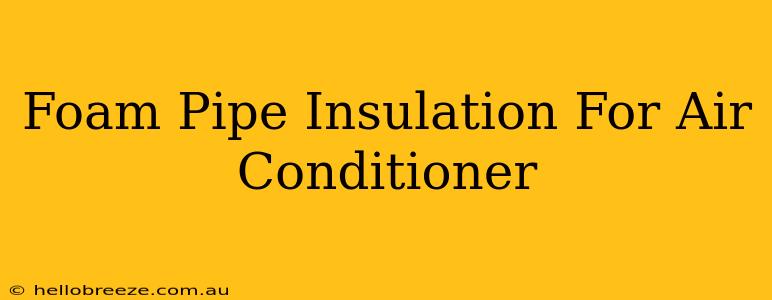Are you looking for ways to improve your air conditioner's efficiency and lower your energy bills? Investing in foam pipe insulation might be the solution you've been searching for. This comprehensive guide will delve into the benefits, types, installation, and considerations of using foam pipe insulation for your air conditioning system.
Understanding the Benefits of Foam Pipe Insulation for AC Units
Improperly insulated AC pipes lead to significant energy loss. Heat transfer between the refrigerant lines and the surrounding environment causes your system to work harder, consuming more energy and potentially reducing its lifespan. Foam pipe insulation provides a crucial barrier, minimizing this heat transfer and resulting in:
- Reduced Energy Consumption: By preventing heat gain in the summer and heat loss in the winter, you'll see a noticeable decrease in your energy bills. This translates to significant savings over time.
- Improved System Efficiency: Your AC unit won't have to strain as much to maintain the desired temperature, leading to improved overall efficiency and performance.
- Extended System Lifespan: Less strain on the system translates to a longer lifespan, delaying the need for costly replacements or repairs.
- Increased Comfort: Consistent temperatures throughout your home will lead to a more comfortable living environment.
- Frost Prevention: Proper insulation helps prevent frost formation on refrigerant lines, which can damage your system.
Types of Foam Pipe Insulation for Air Conditioners
Several types of foam insulation are available, each with its own set of advantages and disadvantages:
1. Polyurethane Foam:
- Pros: Excellent insulating properties, durable, moisture-resistant.
- Cons: Can be more expensive than other options.
2. Polyethylene Foam (Closed-Cell):
- Pros: Affordable, lightweight, easy to install.
- Cons: May not offer the same level of insulation as polyurethane foam.
3. Armaflex:
- Pros: High-performance insulation, flexible, good for irregular pipe shapes.
- Cons: More expensive than other options.
Choosing the Right Foam Pipe Insulation
The best type of foam pipe insulation for your air conditioner depends on several factors, including:
- Your Budget: Polyethylene foam offers a cost-effective solution, while polyurethane and Armaflex provide superior insulation at a higher price.
- Climate: In hotter climates, higher-performing insulation like polyurethane or Armaflex might be more beneficial.
- Pipe Size and Shape: Choose insulation that is the appropriate diameter and thickness for your pipes. Flexible insulation works well for irregular shapes.
Installing Foam Pipe Insulation on AC Pipes: A Step-by-Step Guide
While professional installation is always recommended, many homeowners can successfully install foam pipe insulation themselves. Here's a basic guide:
- Measure your pipes: Accurately measure the diameter of your pipes to ensure you buy the correct size insulation.
- Cut the insulation: Use a sharp utility knife or specialized pipe insulation cutter to cut the insulation to the required length. Ensure a snug fit.
- Apply the insulation: Slide the insulation over the pipe, ensuring it's fully seated and covers the entire pipe. Overlap seams where necessary.
- Secure the insulation: Many insulation products come with adhesive or tape to secure the seams and prevent slippage. Follow the manufacturer's instructions.
Frequently Asked Questions (FAQs)
Q: How much will foam pipe insulation save me on my energy bills?
A: The exact savings depend on various factors, including your climate, the size of your AC system, and the level of insulation used. However, you can expect a noticeable reduction in energy consumption.
Q: How often should I replace my foam pipe insulation?
A: The lifespan of foam pipe insulation varies depending on the material and environmental conditions. However, inspecting it annually and replacing it if signs of damage or deterioration are observed is recommended.
Q: Can I install foam pipe insulation myself?
A: While it's possible for DIY enthusiasts, professional installation is always recommended, especially for complex systems.
By investing in foam pipe insulation for your air conditioner, you're making a smart investment in energy efficiency, cost savings, and a longer lifespan for your HVAC system. Remember to choose the right type of insulation and install it correctly to maximize its benefits.

